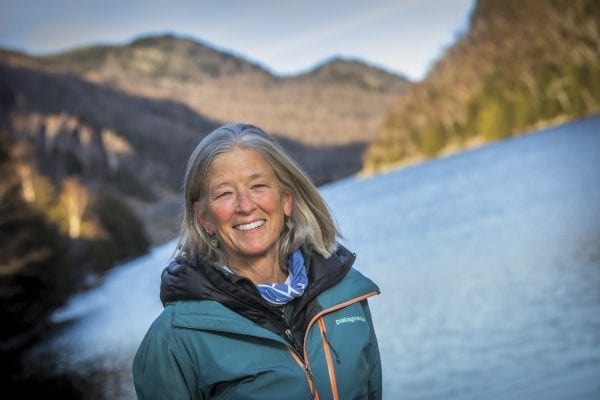After two decades of advocating for the park, Diane Fish prepares to retire

By Leigh Hornbeck
Love brought Diane Fish to the Adirondacks.
Although she was raised nearby in Bennington, Vermont, and Williamstown, Massachusetts, she didn’t know about the Adirondacks until she started dating her future husband, Peter, who spent summers in the park.
“I’ll never forget taking the Trailways bus through Cascade Pass and seeing it for the first time,” she says of arriving in 1981.
The Fishes raised their two children in the Adirondacks and “spend every spare moment” outside skiing, hiking, paddling and biking.
From the 1980s to the early 2000s, Diane Fish worked as a teacher and dean of students—in New Jersey and at Lake Placid’s National Sports Academy—and for a time taught private lessons to Tri-Lakes musicians. Then in 2001 she started as a development associate at the Adirondack Council, a nonprofit founded in 1975 to defend the wild character and ecological integrity of the park. After nearly 20 years of working on behalf of the park in several roles, Fish will retire in February.
“My love for the Adirondacks is at the core of what kept me going, as well as the complexity of the issues. There’s something different every day, every week that requires understanding the policies and what role they play,” Fish says. “It’s intellectually stimulating.”
Subscribe to the magazine
This article is in the Jan/Feb 2021 issue of Adirondack Explorer.
Sign up to get it delivered 7 times a year to your mailbox!
In 2012 she served for just less than a year as acting executive director. She has also served as deputy director and, most recently, senior adviser.
Kathy Moser, now the chief conservation officer for the Open Space Institute and formerly the deputy commissioner for natural resources at the state Department of Environmental Conservation, says Fish’s departure is a loss of a calming influence in the sometimes-tense struggle for control in the park.
“There’s a joke ‘the Adirondacks is a place where people would rather fight than win,’” Moser says. “I never found that with her. She wanted what was best for the forest preserve and was willing to listen to different points of view.”
Fish says she is proudest of the way the Council has grown, both in memberships and dollars. The nonprofit is the park’s largest dedicated to preservation and doubled in size and funding in her tenure. It now has an annual budget of $2.3 million, provided entirely by individual donations and foundations.
But more than money, Fish says, protecting the park and its unique blend of public and private land requires advocacy by regular people. She would like to see a larger share of the park’s 12 million annual visitors learn about the political process, write letters and make calls to lawmakers, because she has seen these actions make a difference.
The key to engaging people, Fish says, is breaking down wonky bureaucratic language—terms like “unit management plan”—and taking apart acronyms so the people who have a stake in what happens—either because they are visitors or residents—understand it. People won’t come forward if they think the issue is too complicated, Fish says.
Fish’s biggest project while at the Council was the classification of the former Finch, Pruyn & Co. land purchased by the Nature Conservancy in 2007. A significant portion is under conservation easements. The state bought 69,000 acres, and the Adirondack Council was among the players in a 10-year process of classifying the land—in short, determining which portions would not be preserved as motor-free wilderness. The Boreas Ponds Tract—nearly 21,000 acres—was the last piece, the jewel in the crown, Fish says. The Council praised the vote by the Adirondack Park Agency in 2018 to split the land into two categories, “wilderness” and “wild forest,” the latter of which has fewer restrictions.
The debate drew thousands of comments submitted during the public hearing.
While throughout her career at the Council Fish was typically not the one who spoke publicly, it was her behind-the-scenes work (along with Council staff) that made the Council’s accomplishments possible.
“Diane was the one who had to slog it out toe-to-toe with governors and members of Congress and the state Legislature, while also running the organization seeking consensus with other conservation organizations,” says John Sheehan, the Council’s longtime communications director. “Through it all, she never lost her sense of humor or her basic kindness.”
Michael Bettmann, current chairman of the Council’s Board of Directors, says Fish’s unusually good interpersonal skills made her a good manager for the talented 18-member staff and make her “extremely effective at creating interest in the Council and its work.”
As Fish steps into retirement, she says she sees less acrimony in the park than during her early years. There’s less vitriol toward the APA, more acceptance, particularly among newcomers, of its value in protecting the Adirondacks, she has noticed. Protecting resources and opportunities for local economies to thrive are two sides of the same coin. She is proud of the Council’s shift to a “more collaborative, less confrontational” tone.
In the future, Fish says she hopes there will be more federal investment in scientific study in the park and the state will invest more time in comprehensive planning. She and Peter aren’t leaving their home in Keene.
They look forward to a post-pandemic time when they can see a show at the Recovery Lounge or the Lake Placid Center for the Arts. In the meantime, they travel the park looking for places to bushwhack. Next summer, look for Fish on the Santanoni Range. She says she and Peter are “accidental 46ers,” who find themselves with just three to go: Panther, Santanoni and Couchsachraga.
"explorer" - Google News
January 11, 2021 at 07:09PM
https://ift.tt/3oD8ixO
For love of wild country - Adirondack Explorer
"explorer" - Google News
https://ift.tt/2zIjLrm
Bagikan Berita Ini














0 Response to "For love of wild country - Adirondack Explorer"
Post a Comment